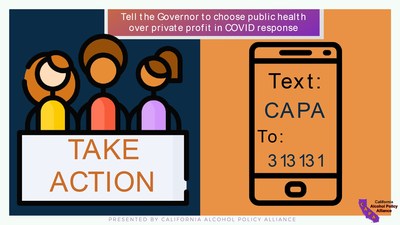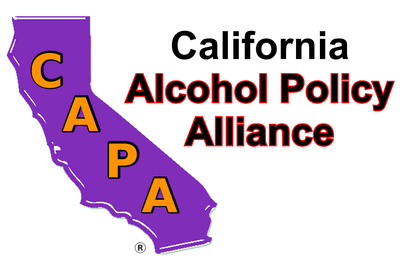Subjects: HSP, PSF, STP, AVO
California Alcohol Policy Alliance (CAPA) holds Governor Gavin Newsom accountable for COVID-19 response failure of making alcohol "essential"
SAN FRANCISCO, July 22, 2020 /PRNewswire/ -- The California Alcohol Policy Alliance (CAPA) held a virtual press event today to acknowledge California Governor Gavin Newsom's failure to make public health and safety essential by instead making alcohol essential in the state during the #COVID19 pandemic. The event launched a letter writing campaign to Newsom urging him and the California Department of Alcohol Beverage Control (ABC) to remove alcohol outlets from essential services, to protect public health and safety. Several youth groups across the state say many of their teenaged peers are getting creative to get alcohol, and it's working.
"Kids today are dressing up at this time as senior citizens to buy alcohol. Teens across TikTok are participating in this challenge and it's crucial now more than ever that ABC policies are still followed and more importantly our leaders address the issues that are driving teens at high rates to alcohol in the first place," said Eric, a high school senior from the Contra Costa County Youth Health Coalition. "We need lasting reforms that hinder this pattern from continuing through the pandemic and after it has passed."
Speakers at the event outlined a litany of issues that have emerged as the coronavirus rages across California. Alcohol consumption is increasing and ways to get alcohol are easing. The California Alcohol Policy Alliance (CAPA) is alarmed by the loosening of alcohol regulations which they call "an immediate threat to the health and well-being of communities." This indicates a serious failure in California by the Governor and the top state agencies reporting to him to acknowledge and address public health and safety concerns of making alcohol essential during the pandemic. The catastrophic annual alcohol-related harms that already plague the state have been dismissed along with the rise in those harms being experienced now that alcohol was deemed essential.
"The California Alcoholic Beverage Control Department needs to make the wellbeing of the people of California essential and not bail out big alcohol," stated Gilbert Mora, Co-Chair, California Alcohol Policy Alliance (CAPA). "Where is the science behind the public consumption of alcohol being essential? No one can drink with their mask on."
According to a study released by the nonprofit research institute RTI International, 35% of people surveyed reported excessive drinking and 27% reported binge drinking in April. About 30% of those surveyed revealed they are drinking several more days per month than they did before the pandemic. The increase is attributed to the stress, boredom and loneliness during the stay at home orders.
Some states, including California, are making it easier to get alcohol. Nationwide alcohol sales climbed 26% between March and June this year compared to the same time last year, according to the Nielsen Corp, driven mainly by online orders which skyrocketed to 243%.
At the beginning of the stay-at-home order in March, the ABC provided special permits allowing cocktails-to-go and alcohol delivery to boost sales for alcohol businesses. On July 1, due to the sudden increase of positive cases and hospitalizations, Governor Newsom announced another shutdown of indoor dining, causing alcohol outlets to heavily rely on takeout and delivery.
"Over-concentration is already epidemic in major California cities," said Carson Benowitz-Fredericks, research manager at Alcohol Justice. "The Los Angeles Drug and Alcohol Policy Alliance reports that 80% of Los Angeles census tracts are over-concentrated, and San Francisco has an even greater density of licensees?so much so that San Francisco legislators appeal to the state for even more licenses because new restaurants cannot make enough money from food sales alone to compete with their neighbors. By giving every alcohol licensee access to an individual's home through delivery, nearly every single census track becomes massively oversaturated."
The prevalence of virtual events such as COVID happy hours, wine and spirits tastings, online parties and social media posts that promote new names for cocktails such as "quarintinis" are highlighting drinking as a way to relieve boredom. This is a danger to public health.
People who are alcohol dependent have weakened immune systems, making it harder to fight off Covid-19. Even individuals who are not addicted but drinking more during the pandemic are at risk for alcohol misuse, which leads to drunk driving, as well as increases in violence, domestic abuse and financial problems. Excessive drinking also increases the risk for liver disease, breast cancer, depression, stroke and heart attack.
Moreover, there is a disproportionate number of alcohol businesses and alcohol advertising in low income minority communities, increases the potential for alcohol related problems in neighborhoods that are already under-resourced.
Veronica de Lara/Co-Chair of CAPA said, "Why are the impacts of alcohol harms and misuse not considered in the state-wide COVID-19 response? What is the science behind alcohol being essential during a global pandemic? Why are we deregulating alcohol? We want answers! Our communities and our families demand public health and safety over economic gain."
Because of the high potential for risky behaviors and subsequent community disruption during the pandemic, CAPA and its community partners strongly urge Governor Newsom to remove alcohol from the list of essential businesses and reinstate ABC regulations that prevent alcohol takeout, delivery, and expanded public consumption in public spaces. Specifically, CAPA is requesting the Governor to:
- Rescind all "temporary" alcohol rules and regulation rollbacks
- Create statewide standard alcohol policy regulations within the Covid-19 response
- Address the disproportionate increase in alcohol harms to low income communities of color
- Increase alcohol taxes and allocate the additional funds to treatment and prevention
- Retire outdated/unused alcohol licenses
CAPA is urging Californians to Text the word CAPA to 313131 to send a message to the Governor asking him to closely re-examine California's relationship with Big Alcohol, acknowledge that excessive alcohol use is No. 3 on the list of preventable causes of death in the state and make public health essential, not alcohol.
California currently suffers over 10,500 alcohol-related deaths, 165,000 alcohol-related hospitalizations and $35 billion in related economic harm.
The California Alcohol Policy Alliance (CAPA) unites diverse organizations and communities in California to protect health and safety, and prevent alcohol-related harm through statewide action.
CAPA Member Organizations
- Alcohol Justice
- Alcohol-Narcotics Education Foundation of California
- ADAPP, Inc.
- ADAPT San Ramon Valley
- Bay Area Community Resources
- Behavioral Health Services, Inc.
- CA Council on Alcohol Problems
- CASA for Safe & Healthy Neighborhoods
- Center for Human Development
- Center for Open Recovery
- DogPAC of San Francisco
- Dolores Huerta Foundation
- Eden Youth & Family Center
- Institute for Public Strategies
- FASD Network of Southern CA
- FreeMUNI ? SF
- Friday Night Live Partnership
- Koreatown Youth & Community Center
- Laytonville Healthy Start
- L.A. County Friday Night Live
- L.A. Drug & Alcohol Policy Alliance
- L.A. County Office of Education
- Lutheran Office of Public Policy ? CA
- MFI Recovery Center
- Mountain Communities Family Resource Center
- National Asian Pacific American Families Against Substance Abuse
- National Council on Alcoholism & Drug Dependence ? Orange County
- Partnership for a Positive Pomona
- Paso por Paso, Inc.
- Project SAFER
- Pueblo y Salud
- Reach Out
- San Marcos Prevention Coalition
- San Rafael Alcohol & Drug Coalition
- SAY San Diego
- Saving Lives Drug & Alcohol Coalition
- South Orange County Coalition
- Tarzana Treatment Centers, Inc.
- The Wall Las Memorias Project
- UCEPP Social Model Recovery Systems
- Women Against Gun Violence
- Youth For Justice
For more information: https://alcoholjustice.org/press-packets
Contact: | Mayra Jimenez 323 683-4687 |
Jorge Castillo 213 840-3336 | |
Michael Scippa 415 548-0492 |
SOURCE California Alcohol Policy Alliance
These press releases may also interest you
|
News published on and distributed by:





